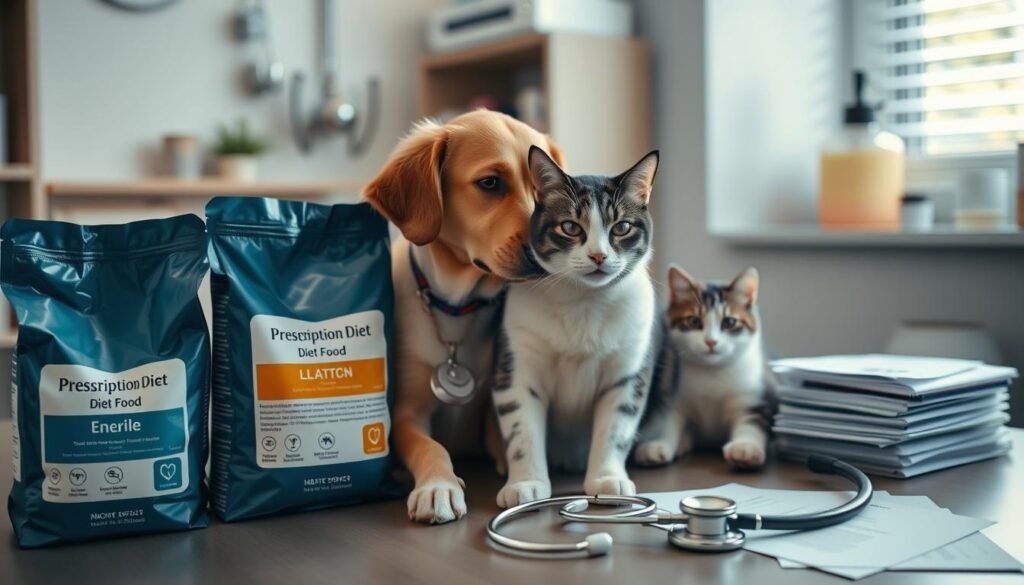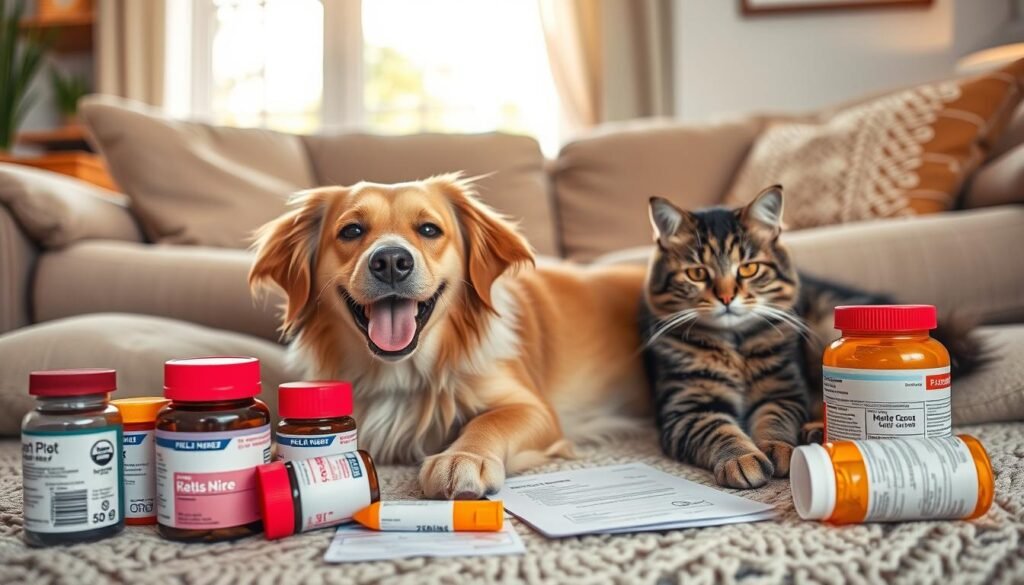Did you know pet insurance can cover up to 90% of prescription costs for your pet1? With pet care costs going up, it’s key to know how insurance handles medication. This article will dive into pet insurance and its role in managing prescription drug costs, chronic conditions, and special pet foods.
Key Takeaways
- Pet insurance can help cover the cost of prescription medications for your pet, including insulin, allergy medications, flea/tick preventatives, and heart medications.
- The extent of medication coverage varies among insurance providers, so it’s essential to compare policies and understand the reimbursement rates and deductibles.
- Comprehensive pet insurance plans often include coverage for prescription medications, chronic conditions, and even specialized pet foods.
- Researching insurance companies that specialize in medication coverage can help you find the best policy for your pet’s healthcare needs.
- Understanding the limitations and exclusions on medication coverage is key to avoid surprises when filing claims.
Understanding Pet Insurance and Medication Coverage
Pet insurance is important for covering prescription medications. Most policies cover medications for conditions treated by a vet, as long as they’re FDA-approved2. This includes antibiotics, anti-inflammatories, pain relievers, and more for infections, parasites, and chronic diseases2.
Types of Medications Covered by Pet Insurance
Pet insurance usually covers:
- Antibiotics for bacterial infections
- Anti-inflammatory drugs for conditions like arthritis
- Pain medications for post-surgical recovery or chronic pain management
- Medications for parasitic infections, such as heartworm, fleas, and ticks
- Medications for chronic diseases like diabetes, cancer, and epilepsy
But, policies might not cover everything. They might not cover pre-existing conditions or routine care like flea, tick, and heartworm prevention2. Always check your policy to know what’s covered and what’s not.
Common Conditions Requiring Prescription Medications
Pets need prescription meds for many health issues, including:
- Infections (bacterial, viral, or fungal)
- Chronic diseases (e.g., diabetes, thyroid disorders, arthritis)
- Allergies and skin conditions
- Pain management (e.g., post-surgery, chronic pain)
- Behavioral issues (e.g., anxiety, aggression)
- Cancer and other terminal illnesses
Knowing what’s covered and what conditions need meds helps pet owners choose the right insurance23.
How Medication Coverage Works with Pet Insurance
When your pet needs prescription meds, you pay first and then claim the cost back from your insurance4. How much you get back depends on your policy’s limits, deductible, and rate4. Some plans cover up to 90% of costs after your deductible, while others might only cover 50% or have yearly limits4.
Reimbursement Rates and Deductibles
It’s key to know your pet insurance policy’s details on reimbursement and deductibles4. The best plans for medication coverage cost between $22 to $68 monthly4. Prices vary based on your pet’s age, breed, and where you live4. For example, a mixed-breed dog in Raleigh, N.C., might cost between $7.79 to $156.19 monthly4.
Pet insurance usually doesn’t cover pre-existing conditions4. But, most providers do cover FDA-approved meds for covered conditions, as long as a vet prescribes them4.
| Medication Type | Average Cost |
|---|---|
| Allergy medication | $50–300 a month |
| Antibiotics | $75–400 per round |
| Antifungals | $60–300 per round |
| Anti-seizure medication | $100–400+ a month |
| Chemotherapy | $300–12,000 per round |
| Heartworm prevention | $6–12 a month |
Make sure to check your pet insurance policy for medication coverage details5. Base plans might cover prescription drugs, but preventive meds and OTC products might not be included5.
Some providers, like Spot, offer extra coverage for prescription food, supplements, and alternative therapies5. Knowing your pet’s medication needs and the coverage options helps you choose the best plan6.

Does Pet Insurance Cover Prescriptions for Chronic Conditions?
Pet insurance for chronic conditions and ongoing meds varies by provider. Some plans cover all costs, while others have limits or exclude them. This is often true if the condition existed before the policy started7.
It’s key to check a pet insurance policy’s details on chronic meds coverage. Some might not cover pre-existing conditions or have limits on ongoing meds7. Knowing this helps pet owners choose the best insurance for their pets.
Pets with chronic conditions like diabetes or arthritis need regular meds. Pet insurance can help a lot with these costs. Owners should look closely at policy details to make sure it covers their pet’s needs8.
“Prescription medication coverage is included for conditions that require chronic treatment, such as thyroid problems, within the Complete CoverageSM plans.”8
When picking pet insurance, think about chronic conditions and ongoing meds costs. A good plan covers these, helping manage pet care costs798.

Prescription Foods and Pet Insurance
Some pet insurance plans cover the cost of prescription pet foods. These foods are needed for conditions like kidney disease or food allergies10. This coverage is less common than for medications but is very helpful for pets with special dietary needs10.
When looking for pet insurance, ask about coverage for prescription pet foods10. Companies like ASPCA, Pumpkin, Spot, Embrace, and Trupanion offer this benefit. They cover costs from 50% to 100%10. But, some insurers, like Pets Best, might not include this in their standard plans11.
It’s key to read the policy details to know what’s covered and what’s not for prescription diets10. Things like deductibles, waiting periods, and age limits can differ. So, it’s important to compare options to find the right plan for your pet10.
| Insurance Provider | Prescription Food Coverage | Reimbursement Rate | Deductible | Waiting Period |
|---|---|---|---|---|
| ASPCA | Yes | Up to 100% | $100 – $1,000 | 2 – 14 days |
| Pumpkin | Yes | 50% – 100% | $100 – $500 | 2 – 14 days |
| Spot | Yes | 50% – 100% | $100 – $500 | 2 – 14 days |
| Embrace | No | N/A | $200 – $1,000 | 2 – 14 days |
| Trupanion | Yes | 90% | $0 – $1,000 | 2 – 14 days |

In summary, pet insurance for prescription diets is a great benefit for pet owners10. But, the details and limits vary by insurance provider10. It’s vital to carefully review policy documents to understand what’s covered and what’s not10.
Insurance Companies that Cover Pet Medications
There are many top pet insurance providers that cover prescription medications12. Fetch Pet Insurance, for example, covers up to 90% of vet bills, including prescription medications and supplements12. They cover medications for approved conditions, like infections12.
Pet insurance like Fetch covers many vet expenses, including prescription medications and emergency vet visits12. But, it doesn’t cover medications for pre-existing conditions12.
Other leading pet insurance providers include ASPCA Pet Health Insurance, Embrace, Figo, Healthy Paws, Lemonade, ManyPets, MetLife, Nationwide, Pets Best, Spot Pet Insurance, and Trupanion2. Each company has different coverage, reimbursement rates, and exclusions2. It’s important to check each policy carefully2.
| Pet Insurance Provider | Medication Coverage |
|---|---|
| Fetch Pet Insurance | Up to 90% coverage for prescription medications and supplements12 |
| ASPCA Pet Health Insurance | Coverage for prescription medications, subject to policy details |
| Embrace | Coverage for prescription medications, subject to policy details |
| Figo | Coverage for prescription medications, subject to policy details |
| Healthy Paws | Coverage for prescription medications, subject to policy details |

When choosing pet insurance, it’s key to review policy details122. This helps you find the best plan for your pet’s health needs, including medication122.
Comparing Medication Coverage Across Pet Insurance Providers
Finding the right pet insurance plan is key for your pet’s medication needs. Plans for dogs start at $13 a month, and for cats, at $7 a month13. Exotic pets can get insurance for about $9 to $20 a month13. Many insurers offer discounts for multiple pets, saving you up to 10% for four or more pets13.
When looking at pet insurance, check what medications are covered, how much you’ll get back, and any limits14. Some plans cover more but cost more, while others are cheaper but have limits14. It’s smart to compare several options to find the best for your pet.
| Provider | Medication Coverage | Reimbursement Rate | Deductible |
|---|---|---|---|
| Nationwide | Includes prescription food coverage under certain plan types or as an optional rider | Varies by plan | As low as $100, with most pet owners opting for a $250 annual deductible |
| Healthy Paws | Covers prescription medications for covered conditions | 70-90% of covered costs | $250 or $500 annual deductible |
| Trupanion | Covers prescription medications for covered conditions | 90% of covered costs | $0 or $250 per condition deductible |
Remember, coverage details change with the plan you choose13. Some plans have limits for certain conditions, like hereditary ones in cats over 813. You can add new pets to one account, but each needs its own policy13.
When comparing plans, think about the waiting period, canceling or changing coverage, and any discounts13. Researching and comparing can help you find the best plan for your pet and budget.
Comparing pet insurance plans helps you choose the best for your pet’s medication needs14. Whether it’s a dog, cat, or exotic pet, finding the right plan ensures your pet gets the care they need15.
does pet insurance cover prescriptions
Prescription medications for pets can be very expensive. But, pet insurance can help with these costs16. Most policies cover prescription drugs if a vet prescribes them for a covered condition.
Commonly covered medications include antibiotics, anti-inflammatory drugs, and pain relievers17. Some plans also cover specialty diets or supplements16.
But, the coverage for prescription drugs varies a lot17. It’s key to check your policy well to know what’s covered for your pet’s meds.
- Pet insurance can cover a wide range of prescription medications, including antibiotics, anti-inflammatory drugs, and medications for chronic conditions.
- The level of prescription drug coverage can vary between insurance providers and policy types, so it’s important to review the details of your plan.
- Specialty diets and supplements prescribed by your vet may also be covered under some pet insurance policies.
Pet insurance costs vary a lot. For a short-hair domestic cat, it’s around $20 a month. For a Labrador Retriever, it’s over $5018. The cost depends on the pet’s age, where you live, and how much coverage you choose.
Pet insurance is a great way to protect your pet’s health161718. It helps with the cost of essential medications and treatments.
Costs of Pet Prescriptions with and without Insurance
Pet prescriptions can quickly become expensive, even more so for pets with ongoing health issues19. In 2023, over 5.6 million U.S. dogs and cats had pet insurance, a 17% jump from the year before19. Without insurance, pet owners face annual costs of about $676 for dogs and $383 for cats. This works out to around $56 a month for dogs and $32 a month for cats19.
Potential Savings with Pet Insurance
Pet insurance can reduce these costs, but savings vary based on your policy and pet’s needs19. Accident-only policies cost less, at $204 for dogs and $116 for cats annually19. Premiums change based on your pet’s age, breed, and where you live19. For example, a medium-sized mixed-breed dog’s monthly premium can range from $31.50 at 2 years to $156.59 at 12 years19. A domestic shorthair cat’s premium can vary from $20.14 at 2 years to $107.09 at 14 years19.
Without insurance, a single prescription can cost from tens to hundreds of dollars20. Common pet prescriptions include vaccinations ($60), heartworm medication ($40/month), Lyme disease treatment ($50), and flea control ($100)20. With insurance, you might only pay 10-20% of the cost after meeting your deductible19. This can save a lot, mainly for pets needing ongoing or multiple medications.
Looking into the medication coverage and costs of different pet insurance plans is key to finding the right one for your pet’s prescription needs19.
“The most common types of pet insurance claims for dogs were dermatitis, gastroenteritis, ear infection, degenerative arthritis, and trauma; for cats, it included urinary tract disease, kidney failure, dental disease, hyperthyroidism, respiratory infection, and inflammatory bowel disease.”19
Limitations and Exclusions on Medication Coverage
When you think about getting pet insurance, it’s important to know what’s not covered. Pet insurance exclusions for medications and limitations on prescription drug coverage can differ a lot. So, make sure to check the policy details closely.
One big exclusion is for pre-existing conditions. Most pet insurance won’t cover meds for conditions your pet had before the policy started21. If your pet was already on meds for something, the insurance might not pay for them.
Also, some insurers won’t cover certain types of meds. What pet medications are not covered by insurance can include things like heartworm, flea, and tick prevention21. These are often seen as routine care and might need a special add-on to the policy.
Some insurers have limits on how much they’ll pay for meds21. This means there’s a cap on the total amount they’ll cover for meds over the policy’s life or in a year.
To really get what your pet insurance covers, you should read the policy documents carefully2. If you’re unsure about anything, ask questions. This way, you can make sure your pet gets the right care for their meds.
“Thoroughly understanding the limits of your pet insurance coverage is key to managing your pet’s healthcare costs and ensuring your furry friend receives the treatment they need.”
Conclusion
Pet insurance can help a lot with the costs of your pet’s medication, whether it’s for a sudden illness or a long-term condition22. But, how much coverage you get can really vary. It depends on the insurance company and the type of policy you choose.
When looking for pet insurance with prescription benefits, it’s key to check each plan’s details. You need to know what medications are covered, how much you’ll get back, any costs you have to pay upfront, and what’s not included22.
It’s worth taking the time to compare pet insurance options to find the best one for your pet’s needs22. Some companies, like23Spot Pet Insurance, even cover prescription foods in their basic plans. This can help manage your pet’s medication and food costs better.
In the end, knowing the policy details for your pet’s medication needs is key when picking a pet insurance plan2223. By carefully looking at the coverage, you can make sure your pet gets the right care. And, you can also keep your household’s finances in check2223.
FAQ
What types of medications are typically covered by pet insurance?
How does the reimbursement process work for prescription medications?
Does pet insurance cover medications for chronic conditions?
Does pet insurance cover the cost of prescription pet foods?
Which pet insurance companies offer the best medication coverage?
How can I compare pet insurance plans for medication coverage?
Does pet insurance cover prescriptions for pre-existing conditions?
How can pet insurance help manage the costs of prescription medications?
Source Links
- Does Pet Insurance Cover Prescriptions? | MetLife Pet Insurance – https://www.metlifepetinsurance.com/blog/pet-insurance/medical-prescriptions/
- How Does Pet Medication Coverage Work? – https://www.progressive.com/answers/pet-insurance-medications/
- Does Pet Insurance Cover Your Pet’s Medication And Perscriptions? | Bankrate – https://www.bankrate.com/insurance/pet-insurance/does-pet-insurance-cover-medication/
- Does Pet Insurance Cover Medication? – https://www.marketwatch.com/guides/pet-insurance/does-pet-insurance-cover-medication/
- Does Pet Insurance Cover the Cost of Medication? | Spot® – https://spotpet.com/blog/why-pet-insurance/does-pet-insurance-cover-the-cost-of-medications
- Does Pet Insurance Cover Medication? • Lemonade – https://www.lemonade.com/pet/explained/pet-insurance-cover-medication/
- Nationwide® Pet Medical Insurance Plans | See What’s Covered – https://www.petinsurance.com/whats-covered/
- What Does Pet Insurance Cover? | ASPCA® Pet Health Insurance – https://www.aspcapetinsurance.com/research-and-compare/pet-insurance-basics/whats-covered/
- What Medical Expenses Does Pet Insurance Cover For Your Pet? | Bankrate – https://www.bankrate.com/insurance/pet-insurance/what-medical-expenses-pet-insurance-covers/
- Pet Insurance That Covers Prescription Food | LendEDU – https://lendedu.com/blog/pet-insurance-covers-prescription-food/
- Does Pet Insurance Cover Prescription Food? – NerdWallet – https://www.nerdwallet.com/article/insurance/does-pet-insurance-cover-prescription-food
- Does pet insurance cover medication? – https://www.fetchpet.com/the-dig/does-pet-insurance-cover-medication
- Nationwide® Pet Insurance FAQ | What’s Covered, How it Works & Claims – https://www.petinsurance.com/faq/
- Pet Insurance Simplified| ASPCA Pet Health Insurance – https://www.aspcapetinsurance.com/resources/pet-insurance-simplified/
- Does Pet Insurance Cover Pre-Existing Conditions? – https://www.petmd.com/general-health/does-pet-insurance-cover-pre-existing-conditions
- Does Pet Insurance Cover Prescription Food? | MetLife Pet Insurance – https://www.metlifepetinsurance.com/blog/pet-insurance/food-vitamins/
- What Does Pet Insurance Cover? – https://www.embracepetinsurance.com/waterbowl/article/what-does-pet-insurance-cover
- What Does Pet Insurance Cover? – https://www.forbes.com/advisor/pet-insurance/what-does-pet-insurance-cover/
- Is Pet Insurance Worth It? 2024 Guide – NerdWallet – https://www.nerdwallet.com/article/insurance/is-pet-insurance-worth-it
- Does Pet Insurance Cover Medication? – https://www.insuranceopedia.com/pet-insurance/does-pet-insurance-cover-medication
- Nationwide Pet Insurance Plan Restrictions | Excluded Conditions – https://www.petinsurance.com/plan-restrictions/
- What Does Pet Insurance Cover? (2024 Guide) – NerdWallet – https://www.nerdwallet.com/article/insurance/pet-insurance-coverage
- Will Pet Insurance Cover the Cost of Prescription Pet Food? | Spot® – https://spotpet.com/blog/why-pet-insurance/does-pet-insurance-cover-prescription-food
